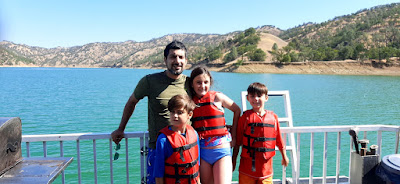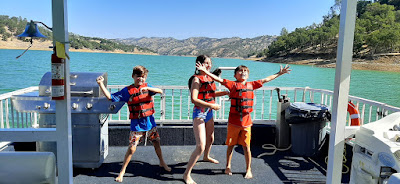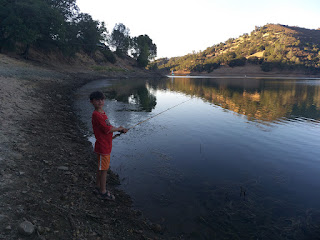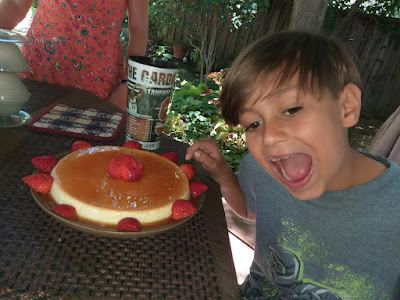Does it ever seem like talking about your faith is like walking through a minefield? There seems to be so many topics and buzzwords that if used carelessly will set off an explosion that can destroy a conversation, or even a budding friendship. The danger naturally leads to fear, and fear can paralyze us and stop us for entering into the topic at all. So unless you already know that someone is on the same page as you, it can feel so much safer to steer clear of anything that could be a mine. But at the same time, when we approach a new person, the mines can surprise us. Politics, current events, race, gender issues, sexuality, abuse in the church, theology, food, drink, dress, entertainment— explosive mines can be hiding in lots of topics depending on the person, culture or society.
 |
Enjoying a few days at a lake
|
Some people are so scarred from explosions that they retreat among people that are the same as them, to communities that (theoretically) have no hidden mines. They get tired or bitter, or resigned or angry and don’t have the motivation to walk into untested fields, to engage people of different perspectives, opinions or backgrounds. Basically, they give up and play it safe.
Other people look at the minefield and love the explosions. They love to see people get angry and riled up, so they intentionally stomp on the mines, using words that are offensive and poking at topics that are especially sensitive and likely to cause an explosion. When they do this, they only make the minefields in our society more plentiful and more sensitive. For reactive people, it becomes hard to differentiate between those that are stepping on mines unintentionally (out of ignorance or blindness) and those who are doing it to be aggressive and to start fights, making every interaction fraught with tension and possible minefields.
On the islands (like every culture and society), there are mines. If someone is ignorant of the context, they might be unaware of what the mines are or where they are. We see tourists come through the islands sometimes, and see how (through their clothes, behavior, words and attitudes) they are stepping on island mines all over the place— destroying any chance of having meaningful conversation or relationship with islanders. They’ve ruined their reputations (and the reputations of others) without even knowing it. But they are just tourists and they aren’t around long enough to care that they are leaving things more reactive and explosive for the next foreigner.
 |
Makes our kids want to dance!
|
But most of our lives, we’re not visitors and our actions have lasting impact on us and others. When you are interacting with your neighbor or co-worker, with someone you have to be in regular contact with or someone you want to get to know better, the consequences of the interaction matter. You don’t want to hurt, damage or stop the relationship at the very beginning by exploding a mine. So what do you do? Always tip-toeing around the mine issues is exhausting and not sustainable. You want to be real and authentic with people. So what do you do?
In our experience, you need a foundational relationship before trying to cross the minefield. So on the islands, we don’t intentionally step on the conversation mines. We know the mines well (at least the ones that are common for all islanders), and at the beginning of a relationship we sidestep them. A mine can destroy a friendship before it even gets going, so we step around it. That doesn’t mean we’re secretive or evasive or lie— if our new acquaintance draws us right to a mine, we follow, but we don’t linger. We redirect the conversation to topics that are more helpful and important at the beginning. It isn’t that these touchy topics are unimportant and should never be broached, but that early in an acquaintance you may not be able to have a conversation on that topic in a productive way that preserves relationship.
 |
Trying fishing (sadly, no catches)
|
Once you have a friendship, things change. We’ve learned that mines become less reactive, less likely to explode once we’ve established an honest relationship. If we’re all friends, then there is a level of trust that means that they won’t explode on us at the first sign of disagreement. They’re more likely to hear us out. At the end of the conversation, we may end up diffusing a mine topic so we won’t have to worry about it again. Or it may still explode, but the damage won’t be as bad, and we can keep walking together and talking. Often a friend will come back and have honest discussion about it afterwards.
Another thing we do is creating a safe space for mine diffusing. Often the person to whom we are talking will be on-edge because of the minefield too. It’s easy to get defensive and angry and make the wrong steps, say the wrong things when you are in a dangerous situation. But if you are in a safe place, you can let your guard down, you know a misstep won’t result in collateral damage. You can speak from your heart with less fear of it being wounded. We can create these safe spaces first by the way we talk about our faith. When we use language, themes, stories and word pictures that don’t offend, we start to create a safe way to speak about faith. If we can then follow through by creating a safe place and time for study and discovery, we will soon find that we have passed through the minefield and made it safely to the other side—a place where we can speak openly, freely, truthfully about our faith with far less fear of explosions and disaster.
As a team on the islands, a team who wants to go deeper with islanders in the midst of the minefield, we rely on prayer, practice and general thoughtfulness. We think a lot about what people’s mine issues are. We practice how to speak to them to create safe zones. We encourage meetings and ways of meeting that foster more openness. And most importantly we pray for them and our interactions with them.
We’ve been back in the States now for quite a few months and we have to ask ourselves, “Is it any different here?” The mines might be different, but the minefields feel the same. We see the same forms of hiding or mine stomping here as we see on the islands. And we see the same need to be thoughtful, prayerful and practiced. We know it feels dangerous and it can be scary, but let’s not allow fear to stop us from walking into the minefield with people who are different than us. Let’s learn to cross the minefield for the green peaceful fields of love and relationship on the far side.
PRAYERS ANSWERED
We had a great couple of days enjoying the outdoors and swimming on a lake. This time with family was both fun and safe. We continue to get chances to share with people about our work via zoom and appreciate the opportunity we had this past week with our faith family here in California. We received lots of messages from island friends and neighbors wishing us a “happy holiday.” It’s good to see that we are still remembered and appreciated. We sent plenty of our own messages out in return. (In case you’re wondering, the holiday is called Eid al-Adha and commemorates the near sacrifice of Abraham’s son.) We continue to be thankful for good health.
PRAYERS REQUESTED
One of our teammates back on Clove Island is leaving the islands on Wednesday to return to the States. (She was able to get on a special chartered flight leaving the islands— normal flights still not open.) She is coming back to the US to help a family member who’s is in a tough situation and will probably be there for a few months. Pray for her transition to the States and for our remaining two teammates that she will leave behind. Also pray as she hopes to continue some of her work with islanders remotely. Two island colleagues from the small island are about to have a baby! COVID meant they were not able to travel home to be with family for the birth, so the birth will be on the islands. Please pray for an easy and safe delivery in the coming weeks. Although news from the islands continues to see small effects of COVID the numbers in the rest of Africa are getting worse. Pray for Africa and its limited health care system in these difficult times.














